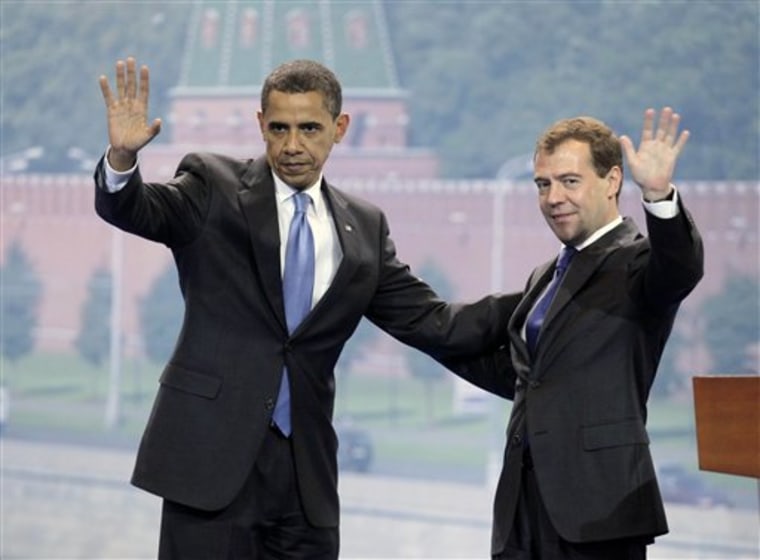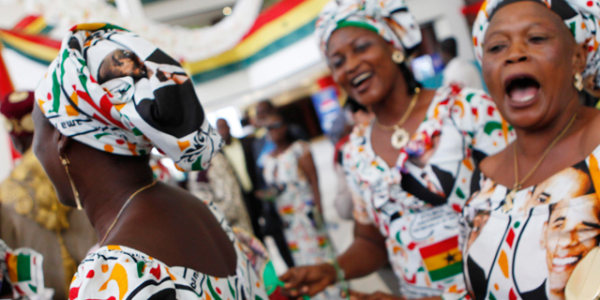For two days, President Barack Obama pressed the reset button with Russia.
The results: He ended up getting the expected agreement on deep cuts in nuclear arsenals, but he is leaving Moscow with few assurances of Kremlin help in solving other issues key to his foreign policy agenda.
He is also leaving behind a spark he hopes will blaze to life and thaw U.S. relations with a former superpower with a chip on its shoulder. But his two days of summitry produced no unexpected breakthroughs.
Throughout the meetings and speeches, Obama stayed on message: The United States and Russia have too many overlapping interests to move through the coming decades at odds. The time for confrontational Cold War thinking is well-past. America wants Russia to be "strong, peaceful and prosperous."
He told the graduating class at Moscow's New Economic School that the United States and Russia were not "destined to be antagonists," but he predicted — nevertheless — hard bargaining as the two nations work to overcome a long history of estrangement.
"It is difficult to forge a lasting partnership between former adversaries. But I believe on the fundamental issues that will shape this century, Americans and Russians share common interests that form a basis for cooperation," he said.
No give
On several issues key to Obama foreign policy, the Russians were unbending, at least for now.
_While they agreed to join the U.S. in reassessing the threat from Iran's nuclear ambitions, there was no hoped-for Kremlin offer of direct intervention with Tehran. The Russians make significant profits from arms sales to Iran and the construction a nuclear complex for electricity generation.
_On the flash point issue of Georgia, where the Russian army crushed the tiny country's military a year ago, the Kremlin rejected U.S. complaints about Russian insistence that breakaway Abkhazia and South Ossetia remain free of Georgian control. Moscow, meantime, remained angry over U.S. refusal to back away from support for Georgia's hopes to join NATO.
Slideshow 29 photos
Obama overseas
After his breakfast meeting with Prime Minister Vladimir Putin, Obama told Fox News Channel "on areas where we disagree, like Georgia, I don't anticipate a meeting of the minds anytime soon."
_Nor did there appear to have been progress in the dispute over arms control. While preparing a START I replacement treaty that would cut nuclear arsenals by about one-third, Moscow and Washington remained fundamentally at odds over U.S. plans for creating a missile defense system in Eastern Europe. U.S. officials discount Russian complaints about American intentions. But Moscow was still saying the two issues must be linked or a final agreement on cutting nuclear warheads and delivery systems could be in jeopardy. Washington insists missile defense is designed to protect U.S. allies against a potential nuclear attack by Iran. The Russians say such a system would put them at a disadvantage by unbalancing offensive nuclear parity.
Matters of substance
The two sides did agree to far greater cooperation on Afghanistan, where Obama is bolstering U.S. troop strength in the fight against Taliban militants and other al-Qaida allied groups. Part of the deal will allow the U.S. to fly, without transit charges, American troops, weapons and other lethal war materiel across Russian territory. Such U.S. overflights had been limited to non-lethal supplies for the U.S.-led NATO force in Afghanistan, a country from which Russia withdrew in defeat 20 years ago after a decade-long occupation.
Negotiators also prepared a series of side agreements and established a commission nominally headed by Obama and Russian President Dmitry Medvedev. It is designed to quicken the pace of U.S.-Russian engagement across a whole range of issues important to both countries.
In a briefing on the last day of the Obama visit, his top adviser on Russian affairs, Michael McFaul, dared reporters to find a past U.S.-Soviet summit where the two sides had dealt with so many matters of substance.
"We hit all of the dimensions of the U.S.-Russian relationship. ... That's a good start to what now begins the harder process of building this relationship in a more sustained way," McFaul said.
'KGB remains the same'
Obama also joined two so-called parallel summits Tuesday afternoon, one of business leaders, the other of civil society organizations. Later he met privately with political opposition figures who are under near constant pressure in Russia's atmosphere of contracting democratic protections and press freedom.
Among the group was former world chess champion Garry Kasparov, who said Obama appeared to have held his own in his talks with Russia's leaders.
"This government is not ready for a dialogue. This government has the mentality of street hoodlums. I think that after looking into Obama's eyes Putin understood that this guy won't stand any jokes."
Outside the luxury hotel where Obama met with opposition leaders, a young man held up a sign that said: "Everything changes. The KGB remains the same." The sign was ripped from his hands by police and he slipped away. Putin is a former KGB officer, as are many of the officials serving in his government.
Wednesday morning Obama heads to a G-8 summit in Italy. While there he will meet Pope Benedict XVI, before moving on to Ghana where he plans to deliver what the White House describes as a major foreign policy speech.

